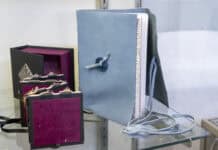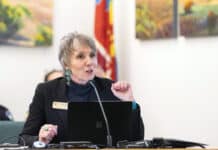
Despite there often being more questions than answers during this uncertain time, Sedona city officials are saying that for the most part things will remain status quo — at least for now.
That was the message expressed by Sedona City Manager Justin Clifton during the Tuesday, April 14, Sedona City Council meeting. A few specific topics were discussed, including that of the city budget.
“This [city finances] is hard to pin down right now because we have a significant lag in receiving sales and bed, which is our primary revenue source,” he said. “Being a tourist-based economy, we’re largely going to be impacted by the shutdown in terms of the decline in sales and bed tax revenue.”
Clifton said some have speculated the result of the COVID-19 pandemic will be another Great Depression while others have said it will be a sharp recession but with a rapid recovery. But for now, Clifton said it’s still too early to know, especially since there is no time frame as to when the economy will reopen and how long that may take. Not only that, but how will consumers respond?
“In having conversations with others today, will people have a lot of pent up demand and when the light is green everyone rushes out and visits places, spends money and things like that?” Clifton said. “Will there be some concern and fear left among some people and they continue not to do those things?”
There is nothing elected leaders and economists can look back on to see how this should be handled in the past because it’s never happened, he said. So for now, they’re in a bit of a wait and see mode.
“We’ve set ourselves up really well and have said for years that if we had a recession or something like it we’d be prepared,” he said. “I’m not saying it’s going to be easy but frankly, we’re probably in a better position, relative to our size, than any other community I know about.”
Prior to the council meeting, Clifton and Finance Director Cherie Wright were asked about the impact the current situation will have on the budget. Wright said it’s really too soon to know what the drop will be. The city won’t get March numbers until mid to late May and April numbers until mid to late June.
“We’re looking at hotel occupancy rates as one of the factors in sales and bed tax revenues,” Wright said. “When I spoke to the chamber last week, they only had preliminary hotel occupancy numbers for March. Those are looking like they may be a little more than half of the occupancy rate from last March, which was 86%. With the governor’s stay-at-home order for the full month of April, we’re expecting hotel occupancy to be very low compared to last April’s 85%.”
Even though the figures are not yet ready to compare, city sales tax revenues for March of last year came in at $2,304,663, April saw $2,182,014 and May at $2,049,526. During those same three months, the total bed tax revenue to the city was $1,606,096.
Clifton said there will certainly be significant and prolonged impact from this pandemic and the various business restrictions and isolation strategies that have been needed to slow the spread.
“That said, the city is also in a very fortunate position thanks to sound financial management over the last many years,” he said. “At the moment it’s still hard to estimate the total impact of the economic decline.”
Wright has been actively monitoring the reports of various national and local economists to glean their insights, Clifton said. She has also built a model that helps staff estimate declines in revenue based on key indicators of the tourist economy such as hotel occupancy rates.
“In other words, with the model we can adjust assumptions for occupancy over the next 15 months to see an estimated correlated reduction in sales and bed taxes for retail, restaurant and other industry sectors,” he said. “This helps us to create best and worst case scenarios. Beyond that we are also creating tiers of potential reductions of expenditures that would correlate to those best and worst case scenarios.”
That way, as the city sees revenues come in and they clarify the severity of the declines, the city will already have a series of plans in place for expense reductions in order to respond in real time.
Clifton said the first thing the city can do is pledge unallocated reserves from previous years, which will help reduce the need to cut services or staff. But even with that it is likely that there will be reductions across the board in discretionary spending such as travel and training.
There will likely be a freeze on any new positions and in some instances a freeze on replacing positions and some major capital improvements will likely be delayed.
“When it comes to the budget, we will still need to establish a spending limit that contemplates a best case scenario since we cannot exceed whatever limit we establish when we adopt the budget,” Clifton said. “But many of those expenses will also be on freeze until such time that we feel confident we can proceed.”



















